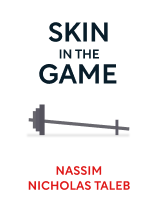

This article is an excerpt from the Shortform book guide to "Skin in the Game" by Nassim Nicholas Taleb. Shortform has the world's best summaries and analyses of books you should be reading.
Like this article? Sign up for a free trial here .
Is Nassim Taleb’s Skin in the Game worth reading? How does Taleb define having your “skin in the game”?
Skin in the Game is the 2018 addition to Nassim Nicholas Taleb’s bestselling Incerto, a series of philosophical nonfiction works dedicated to exploring how uncertainty defines our world. The book is a treatise on the necessity of skin in the game—the need for everyone to be held accountable for the consequences of their actions.
In this Skin in the Game review, we’ll cover the book’s context, background, and critical reception by the readers.
About the Author
Nassim Nicholas Taleb is a Lebanon-born author and statistician. A provocateur in the academic world, Taleb is simultaneously lauded for his revolutionary insights and criticized for his bombastic, combative style.
Taleb draws heavily from his experience as a former options trader, to which he attributes his deep familiarity with risk and uncertainty. Taleb earned a Ph.D. in management science from Paris Dauphine University and has researched and taught risk management and probability at institutions such as the University of Massachusetts Amherst, Oxford University, and NYU’s Tandon School of Engineering.
He is the author of the critically acclaimed books Fooled by Randomness (2001), The Black Swan (2007), and Antifragile (2012).
Connect with Nassim Nicholas Taleb:
The Book’s Publication
Publisher: Penguin Random House
Skin in the Game was published in February of 2018, six years after the release of his previous work Antifragile. Several chapters from Skin in the Game were published on Medium over the course of a year and a half preceding its official release.
Skin in the Game is the fifth book in Taleb’s critically acclaimed Incerto series. The book expands upon many of the ideas established in the previous Incerto works, putting greater emphasis on the ethical and political implications of Taleb’s philosophy.
This addition to the Incerto was originally unplanned—in the introduction to Skin in the Game, Taleb states that he considered retiring as an author after finishing Antifragile but soon felt the irresistible need to combat the “well-marketed nonsense” of modern intellectuals. For this reason, he began writing Skin in the Game.
The Book’s Context
Taleb intended this book as a response to the work of those influential academics who he perceived to be propagating dangerous misinformation and faulty thinking. He argues that because these intellectuals lack “skin in the game,” errors in their thinking are never corrected, and the negative consequences of their ideas can never be directly observed.
Among the books Taleb specifically criticizes are Capital in the Twenty-First Century by Thomas Piketty, Nudge by Richard Thaler and Cass Sunstein, and The Better Angels of Our Nature by Steven Pinker. Taleb poses direct counterarguments to each of these books in chapters dedicated to economics, rationality, and the history of war, respectively, and he disparages their status as risk-exempt intellectuals throughout the book.
In other chapters, this book is a natural progression from the ideas presented in Taleb’s earlier Incerto works. He has previously advised individuals and organizations on how best to operate in a deeply unpredictable world—now, he details his vision of an effective, moral civilization within this uncertain world and points out in greater detail where he sees modern society fall short, addressing new topics such as employment and virtue.
Critical Reception
Skin in the Game debuted at #2 on the New York Times Bestseller list, despite Taleb’s choice to refrain from promoting the book or sending out copies to reviewers.
Skin in the Game book reviews were largely positive. Critics and readers alike praised the book for being Taleb’s most complete view of the world to date, completing the holistic philosophy established throughout the Incerto. Fans of Taleb’s unique voice were satisfied, as he’s brasher and snappier than ever. Overall, nearly all critics were at least somewhat receptive to Taleb’s central thesis of accountability and consequence.
However, critics disliked Taleb’s prideful animosity that dominates much of this book. Phil Coggan of The Economist mourns that the author behind The Black Swan has become “submerged,” overpowered by “a second Mr. Taleb,” a “cantankerous and over-opinionated [cab] driver.” Some critics and readers questioned the validity of Taleb’s more specific sub-arguments, especially since his conclusions are so extreme. For example, Taleb at one point advocates for the total elimination of salaried research positions—an impractical proposal at best.
Interestingly, Taleb posted a direct response to the most popular critical reviews of Skin in the Game, calling out what he sees as critics’ misunderstandings of his work.
Commentary on the Book’s Approach
Taleb deliberately cultivates an abrasive style in his writing—one that bounces from topic to topic without fully fleshing out many of the points he makes. There are more ideas than justification in this book, but the book becomes somewhat more focused as it progresses.
In the introduction, Taleb claims his book is “organized the way the reader reads, or wants to read, and according to how deep the author wants to go into a topic,” but the intentionally stream-of-consciousness flow of ideas makes it difficult to detect the larger argument that Taleb is driving toward in each chapter.
On the other hand, Taleb’s idea-dense prose gives the book an engaging forward momentum. The twists and turns of his train of thought keep things consistently interesting. And, while the links between ideas can be hazy, the ideas themselves are presented in clear, precise language, making it easy to follow Taleb down his winding path.
Commentary on the Book’s Organization
Taleb posted many of the chapters in this book separately online before publication, and, consequently, the book reads at times like a collection of loosely connected essays. The sequencing of chapters comes off as somewhat arbitrary. Taleb groups the chapters into “Books” of inconsistent length, stitching together chapters that don’t obviously belong with one another. Some topics are spread out throughout the book when they would be clearer concentrated in a single chapter.

———End of Preview———
Like what you just read? Read the rest of the world's best book summary and analysis of Nassim Nicholas Taleb's "Skin in the Game" at Shortform .
Here's what you'll find in our full Skin in the Game summary :
- Why having a vested interest is the single most important contributor to human progress
- How some institutions and industries were completely ruined by not being invested
- Why it's unethical for you to not have skin in the game






